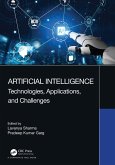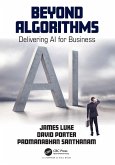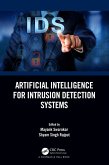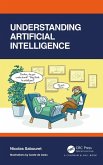Artificial Intelligence Safety and Security (eBook, ePUB)
Redaktion: Yampolskiy, Roman V.
55,95 €
55,95 €
inkl. MwSt.
Sofort per Download lieferbar

28 °P sammeln
55,95 €
Als Download kaufen

55,95 €
inkl. MwSt.
Sofort per Download lieferbar

28 °P sammeln
Jetzt verschenken
Alle Infos zum eBook verschenken
55,95 €
inkl. MwSt.
Sofort per Download lieferbar
Alle Infos zum eBook verschenken

28 °P sammeln
Artificial Intelligence Safety and Security (eBook, ePUB)
Redaktion: Yampolskiy, Roman V.
- Format: ePub
- Merkliste
- Auf die Merkliste
- Bewerten Bewerten
- Teilen
- Produkt teilen
- Produkterinnerung
- Produkterinnerung

Bitte loggen Sie sich zunächst in Ihr Kundenkonto ein oder registrieren Sie sich bei
bücher.de, um das eBook-Abo tolino select nutzen zu können.
Hier können Sie sich einloggen
Hier können Sie sich einloggen
Sie sind bereits eingeloggt. Klicken Sie auf 2. tolino select Abo, um fortzufahren.

Bitte loggen Sie sich zunächst in Ihr Kundenkonto ein oder registrieren Sie sich bei bücher.de, um das eBook-Abo tolino select nutzen zu können.
This book addresses different aspects of the AI control problem as it relates to the development of safe and secure artificial intelligence. It will be the first to address challenges of constructing safe and secure artificially intelligent systems.
- Geräte: eReader
- mit Kopierschutz
- eBook Hilfe
- Größe: 3.53MB
Andere Kunden interessierten sich auch für
![Artificial Intelligence (eBook, ePUB) Artificial Intelligence (eBook, ePUB)]() Artificial Intelligence (eBook, ePUB)54,95 €
Artificial Intelligence (eBook, ePUB)54,95 €![Beyond Algorithms (eBook, ePUB) Beyond Algorithms (eBook, ePUB)]() James LukeBeyond Algorithms (eBook, ePUB)51,95 €
James LukeBeyond Algorithms (eBook, ePUB)51,95 €![Blockchain and Artificial Intelligence Technologies for Smart Energy Systems (eBook, ePUB) Blockchain and Artificial Intelligence Technologies for Smart Energy Systems (eBook, ePUB)]() Hongjian SunBlockchain and Artificial Intelligence Technologies for Smart Energy Systems (eBook, ePUB)52,95 €
Hongjian SunBlockchain and Artificial Intelligence Technologies for Smart Energy Systems (eBook, ePUB)52,95 €![Artificial Intelligence in Information and Communication Technologies, Healthcare and Education (eBook, ePUB) Artificial Intelligence in Information and Communication Technologies, Healthcare and Education (eBook, ePUB)]() Artificial Intelligence in Information and Communication Technologies, Healthcare and Education (eBook, ePUB)47,95 €
Artificial Intelligence in Information and Communication Technologies, Healthcare and Education (eBook, ePUB)47,95 €![Application of Advanced Optimization Techniques for Healthcare Analytics (eBook, ePUB) Application of Advanced Optimization Techniques for Healthcare Analytics (eBook, ePUB)]() Mohamed Abdel-BassetApplication of Advanced Optimization Techniques for Healthcare Analytics (eBook, ePUB)48,95 €
Mohamed Abdel-BassetApplication of Advanced Optimization Techniques for Healthcare Analytics (eBook, ePUB)48,95 €![Artificial Intelligence for Intrusion Detection Systems (eBook, ePUB) Artificial Intelligence for Intrusion Detection Systems (eBook, ePUB)]() Artificial Intelligence for Intrusion Detection Systems (eBook, ePUB)52,95 €
Artificial Intelligence for Intrusion Detection Systems (eBook, ePUB)52,95 €![Understanding Artificial Intelligence (eBook, ePUB) Understanding Artificial Intelligence (eBook, ePUB)]() Nicolas SabouretUnderstanding Artificial Intelligence (eBook, ePUB)28,95 €
Nicolas SabouretUnderstanding Artificial Intelligence (eBook, ePUB)28,95 €-
-
-
This book addresses different aspects of the AI control problem as it relates to the development of safe and secure artificial intelligence. It will be the first to address challenges of constructing safe and secure artificially intelligent systems.
Dieser Download kann aus rechtlichen Gründen nur mit Rechnungsadresse in A, B, BG, CY, CZ, D, DK, EW, E, FIN, F, GR, HR, H, IRL, I, LT, L, LR, M, NL, PL, P, R, S, SLO, SK ausgeliefert werden.
Produktdetails
- Produktdetails
- Verlag: Taylor & Francis eBooks
- Seitenzahl: 474
- Erscheinungstermin: 27. Juli 2018
- Englisch
- ISBN-13: 9781351251365
- Artikelnr.: 55434292
- Verlag: Taylor & Francis eBooks
- Seitenzahl: 474
- Erscheinungstermin: 27. Juli 2018
- Englisch
- ISBN-13: 9781351251365
- Artikelnr.: 55434292
- Herstellerkennzeichnung Die Herstellerinformationen sind derzeit nicht verfügbar.
Dr. Roman V. Yampolskiy is a Tenured Associate Professor in the department of Computer Engineering and Computer Science at the Speed School of Engineering, University of Louisville. He is the founding and current director of the Cyber Security Lab and an author of many books including Artificial Superintelligence: a Futuristic Approach. During his tenure at UofL, Dr. Yampolskiy has been recognized as: Distinguished Teaching Professor, Professor of the Year, Faculty Favorite, Top 4 Faculty, Leader in Engineering Education, Top 10 of Online College Professor of the Year, and Outstanding Early Career in Education award winner among many other honors and distinctions. Yampolskiy is a Senior member of IEEE and AGI; Member of Kentucky Academy of Science, former Research Advisor for MIRI and Associate of GCRI. Dr. Yampolskiy's main areas of interest are AI Safety, Artificial Intelligence, Behavioral Biometrics, Cybersecurity, Genetic Algorithms, and Pattern Recognition. Dr. Yampolskiy is an author of over 150 publications including multiple journal articles and books. His research has been cited by 1000+ scientists and profiled in popular magazines both American and foreign (New Scientist, Poker Magazine, Science World Magazine), dozens of websites (BBC, MSNBC, Yahoo! News), on radio (German National Radio, Swedish National Radio) and TV. Dr. Yampolskiy's research has been featured 1000+ times in numerous media reports in 30 languages.
Preface: Introduction to AI Safety and Security
Acknowledgments
Editor
Contributors
Part I Concerns of Luminaries
Chapter 1 Why the Future Doesn't Need Us
Bill Joy
Chapter 2 The Deeply Intertwined Promise and Peril of GNR
Ray Kurzweil
Chapter 3 The Basic AI Drives
Stephen M. Omohundro
Chapter 4 The Ethics of Artificial Intelligence
Nick Bostrom and Eliezer Yudkowsky
Chapter 5 Friendly Artificial Intelligence: The Physics Challenge
Max Tegmark
Chapter 6 MDL Intelligence Distillation: Exploring Strategies for Safe
Access to Superintelligent Problem-Solving Capabilities
K. Eric Drexler
Chapter 7 The Value Learning Problem
Nate Soares
Chapter 8 Adversarial Examples in the Physical World
Alexey Kurakin, Ian J. Goodfellow, and Samy Bengio
Chapter 9 How Might AI Come About?: Different Approaches and Their
Implications for Life in the Universe
David Brin
Chapter 10 The MADCOM Future: How Artificial Intelligence Will Enhance
Computational Propaganda, Reprogram Human Culture, and Threaten Democracy
... and What can be Done About It
Matt Chessen
Chapter 11 Strategic Implications of Openness in AI Development
Nick Bostrom
Part II Responses of Scholars
Chapter 12 Using Human History, Psychology, and Biology to Make AI Safe for
Humans
Gus Bekdash
Chapter 13 AI Safety: A First-Person Perspective
Edward Frenkel
Chapter 14 Strategies for an Unfriendly Oracle AI with Reset Button
Olle Häggström
Chapter 15 Goal Changes in Intelligent Agents
Seth Herd, Stephen J. Read, Randall O'Reilly, and David J. Jilk
Chapter 16 Limits to Verification and Validation of Agentic Behavior
David J. Jilk
Chapter 17 Adversarial Machine Learning
Phillip Kuznetsov, Riley Edmunds, Ted Xiao, Humza Iqbal, Raul Puri, Noah
Golmant, and Shannon Shih
Chapter 18 Value Alignment via Tractable Preference Distance
Andrea Loreggia, Nicholas Mattei, Francesca Rossi, and K. Brent Venable
Chapter 19 A Rationally Addicted Artificial Superintelligence
James D. Miller
Chapter 20 On the Security of Robotic Applications Using ROS
David Portugal, Miguel A. Santos, Samuel Pereira, and Micael S. Couceiro
Chapter 21 Social Choice and the Value Alignment Problem
Mahendra Prasad
Chapter 22 Disjunctive Scenarios of Catastrophic AI Risk
Kaj Sotala
Chapter 23 Offensive Realism and the Insecure Structure of the
International System: Artificial Intelligence and Global Hegemony
Maurizio Tinnirello
Chapter 24 Superintelligence and the Future of Governance: On Prioritizing
the Control Problem at the End of History
Phil Torres
Chapter 25 Military AI as a Convergent Goal of Self-Improving AI
Alexey Turchin and David Denkenberger
Chapter 26 A Value-Sensitive Design Approach to Intelligent Agents
Steven Umbrello and Angelo F. De Bellis
Chapter 27 Consequentialism, Deontology, and Artificial Intelligence Safety
Mark Walker
Chapter 28 Smart Machines ARE a Threat to Humanity
Kevin Warwick
Index
Acknowledgments
Editor
Contributors
Part I Concerns of Luminaries
Chapter 1 Why the Future Doesn't Need Us
Bill Joy
Chapter 2 The Deeply Intertwined Promise and Peril of GNR
Ray Kurzweil
Chapter 3 The Basic AI Drives
Stephen M. Omohundro
Chapter 4 The Ethics of Artificial Intelligence
Nick Bostrom and Eliezer Yudkowsky
Chapter 5 Friendly Artificial Intelligence: The Physics Challenge
Max Tegmark
Chapter 6 MDL Intelligence Distillation: Exploring Strategies for Safe
Access to Superintelligent Problem-Solving Capabilities
K. Eric Drexler
Chapter 7 The Value Learning Problem
Nate Soares
Chapter 8 Adversarial Examples in the Physical World
Alexey Kurakin, Ian J. Goodfellow, and Samy Bengio
Chapter 9 How Might AI Come About?: Different Approaches and Their
Implications for Life in the Universe
David Brin
Chapter 10 The MADCOM Future: How Artificial Intelligence Will Enhance
Computational Propaganda, Reprogram Human Culture, and Threaten Democracy
... and What can be Done About It
Matt Chessen
Chapter 11 Strategic Implications of Openness in AI Development
Nick Bostrom
Part II Responses of Scholars
Chapter 12 Using Human History, Psychology, and Biology to Make AI Safe for
Humans
Gus Bekdash
Chapter 13 AI Safety: A First-Person Perspective
Edward Frenkel
Chapter 14 Strategies for an Unfriendly Oracle AI with Reset Button
Olle Häggström
Chapter 15 Goal Changes in Intelligent Agents
Seth Herd, Stephen J. Read, Randall O'Reilly, and David J. Jilk
Chapter 16 Limits to Verification and Validation of Agentic Behavior
David J. Jilk
Chapter 17 Adversarial Machine Learning
Phillip Kuznetsov, Riley Edmunds, Ted Xiao, Humza Iqbal, Raul Puri, Noah
Golmant, and Shannon Shih
Chapter 18 Value Alignment via Tractable Preference Distance
Andrea Loreggia, Nicholas Mattei, Francesca Rossi, and K. Brent Venable
Chapter 19 A Rationally Addicted Artificial Superintelligence
James D. Miller
Chapter 20 On the Security of Robotic Applications Using ROS
David Portugal, Miguel A. Santos, Samuel Pereira, and Micael S. Couceiro
Chapter 21 Social Choice and the Value Alignment Problem
Mahendra Prasad
Chapter 22 Disjunctive Scenarios of Catastrophic AI Risk
Kaj Sotala
Chapter 23 Offensive Realism and the Insecure Structure of the
International System: Artificial Intelligence and Global Hegemony
Maurizio Tinnirello
Chapter 24 Superintelligence and the Future of Governance: On Prioritizing
the Control Problem at the End of History
Phil Torres
Chapter 25 Military AI as a Convergent Goal of Self-Improving AI
Alexey Turchin and David Denkenberger
Chapter 26 A Value-Sensitive Design Approach to Intelligent Agents
Steven Umbrello and Angelo F. De Bellis
Chapter 27 Consequentialism, Deontology, and Artificial Intelligence Safety
Mark Walker
Chapter 28 Smart Machines ARE a Threat to Humanity
Kevin Warwick
Index
Preface: Introduction to AI Safety and Security
Acknowledgments
Editor
Contributors
Part I Concerns of Luminaries
Chapter 1 Why the Future Doesn't Need Us
Bill Joy
Chapter 2 The Deeply Intertwined Promise and Peril of GNR
Ray Kurzweil
Chapter 3 The Basic AI Drives
Stephen M. Omohundro
Chapter 4 The Ethics of Artificial Intelligence
Nick Bostrom and Eliezer Yudkowsky
Chapter 5 Friendly Artificial Intelligence: The Physics Challenge
Max Tegmark
Chapter 6 MDL Intelligence Distillation: Exploring Strategies for Safe
Access to Superintelligent Problem-Solving Capabilities
K. Eric Drexler
Chapter 7 The Value Learning Problem
Nate Soares
Chapter 8 Adversarial Examples in the Physical World
Alexey Kurakin, Ian J. Goodfellow, and Samy Bengio
Chapter 9 How Might AI Come About?: Different Approaches and Their
Implications for Life in the Universe
David Brin
Chapter 10 The MADCOM Future: How Artificial Intelligence Will Enhance
Computational Propaganda, Reprogram Human Culture, and Threaten Democracy
... and What can be Done About It
Matt Chessen
Chapter 11 Strategic Implications of Openness in AI Development
Nick Bostrom
Part II Responses of Scholars
Chapter 12 Using Human History, Psychology, and Biology to Make AI Safe for
Humans
Gus Bekdash
Chapter 13 AI Safety: A First-Person Perspective
Edward Frenkel
Chapter 14 Strategies for an Unfriendly Oracle AI with Reset Button
Olle Häggström
Chapter 15 Goal Changes in Intelligent Agents
Seth Herd, Stephen J. Read, Randall O'Reilly, and David J. Jilk
Chapter 16 Limits to Verification and Validation of Agentic Behavior
David J. Jilk
Chapter 17 Adversarial Machine Learning
Phillip Kuznetsov, Riley Edmunds, Ted Xiao, Humza Iqbal, Raul Puri, Noah
Golmant, and Shannon Shih
Chapter 18 Value Alignment via Tractable Preference Distance
Andrea Loreggia, Nicholas Mattei, Francesca Rossi, and K. Brent Venable
Chapter 19 A Rationally Addicted Artificial Superintelligence
James D. Miller
Chapter 20 On the Security of Robotic Applications Using ROS
David Portugal, Miguel A. Santos, Samuel Pereira, and Micael S. Couceiro
Chapter 21 Social Choice and the Value Alignment Problem
Mahendra Prasad
Chapter 22 Disjunctive Scenarios of Catastrophic AI Risk
Kaj Sotala
Chapter 23 Offensive Realism and the Insecure Structure of the
International System: Artificial Intelligence and Global Hegemony
Maurizio Tinnirello
Chapter 24 Superintelligence and the Future of Governance: On Prioritizing
the Control Problem at the End of History
Phil Torres
Chapter 25 Military AI as a Convergent Goal of Self-Improving AI
Alexey Turchin and David Denkenberger
Chapter 26 A Value-Sensitive Design Approach to Intelligent Agents
Steven Umbrello and Angelo F. De Bellis
Chapter 27 Consequentialism, Deontology, and Artificial Intelligence Safety
Mark Walker
Chapter 28 Smart Machines ARE a Threat to Humanity
Kevin Warwick
Index
Acknowledgments
Editor
Contributors
Part I Concerns of Luminaries
Chapter 1 Why the Future Doesn't Need Us
Bill Joy
Chapter 2 The Deeply Intertwined Promise and Peril of GNR
Ray Kurzweil
Chapter 3 The Basic AI Drives
Stephen M. Omohundro
Chapter 4 The Ethics of Artificial Intelligence
Nick Bostrom and Eliezer Yudkowsky
Chapter 5 Friendly Artificial Intelligence: The Physics Challenge
Max Tegmark
Chapter 6 MDL Intelligence Distillation: Exploring Strategies for Safe
Access to Superintelligent Problem-Solving Capabilities
K. Eric Drexler
Chapter 7 The Value Learning Problem
Nate Soares
Chapter 8 Adversarial Examples in the Physical World
Alexey Kurakin, Ian J. Goodfellow, and Samy Bengio
Chapter 9 How Might AI Come About?: Different Approaches and Their
Implications for Life in the Universe
David Brin
Chapter 10 The MADCOM Future: How Artificial Intelligence Will Enhance
Computational Propaganda, Reprogram Human Culture, and Threaten Democracy
... and What can be Done About It
Matt Chessen
Chapter 11 Strategic Implications of Openness in AI Development
Nick Bostrom
Part II Responses of Scholars
Chapter 12 Using Human History, Psychology, and Biology to Make AI Safe for
Humans
Gus Bekdash
Chapter 13 AI Safety: A First-Person Perspective
Edward Frenkel
Chapter 14 Strategies for an Unfriendly Oracle AI with Reset Button
Olle Häggström
Chapter 15 Goal Changes in Intelligent Agents
Seth Herd, Stephen J. Read, Randall O'Reilly, and David J. Jilk
Chapter 16 Limits to Verification and Validation of Agentic Behavior
David J. Jilk
Chapter 17 Adversarial Machine Learning
Phillip Kuznetsov, Riley Edmunds, Ted Xiao, Humza Iqbal, Raul Puri, Noah
Golmant, and Shannon Shih
Chapter 18 Value Alignment via Tractable Preference Distance
Andrea Loreggia, Nicholas Mattei, Francesca Rossi, and K. Brent Venable
Chapter 19 A Rationally Addicted Artificial Superintelligence
James D. Miller
Chapter 20 On the Security of Robotic Applications Using ROS
David Portugal, Miguel A. Santos, Samuel Pereira, and Micael S. Couceiro
Chapter 21 Social Choice and the Value Alignment Problem
Mahendra Prasad
Chapter 22 Disjunctive Scenarios of Catastrophic AI Risk
Kaj Sotala
Chapter 23 Offensive Realism and the Insecure Structure of the
International System: Artificial Intelligence and Global Hegemony
Maurizio Tinnirello
Chapter 24 Superintelligence and the Future of Governance: On Prioritizing
the Control Problem at the End of History
Phil Torres
Chapter 25 Military AI as a Convergent Goal of Self-Improving AI
Alexey Turchin and David Denkenberger
Chapter 26 A Value-Sensitive Design Approach to Intelligent Agents
Steven Umbrello and Angelo F. De Bellis
Chapter 27 Consequentialism, Deontology, and Artificial Intelligence Safety
Mark Walker
Chapter 28 Smart Machines ARE a Threat to Humanity
Kevin Warwick
Index







